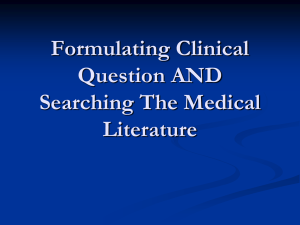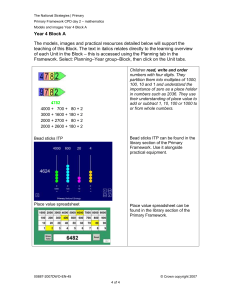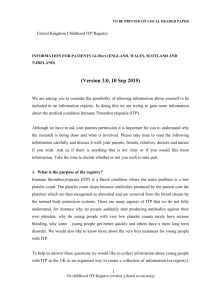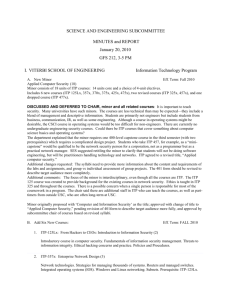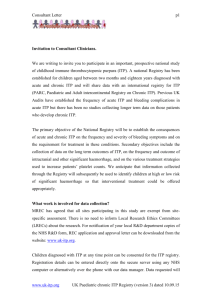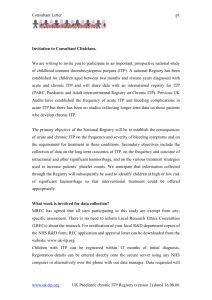Patient information sheet
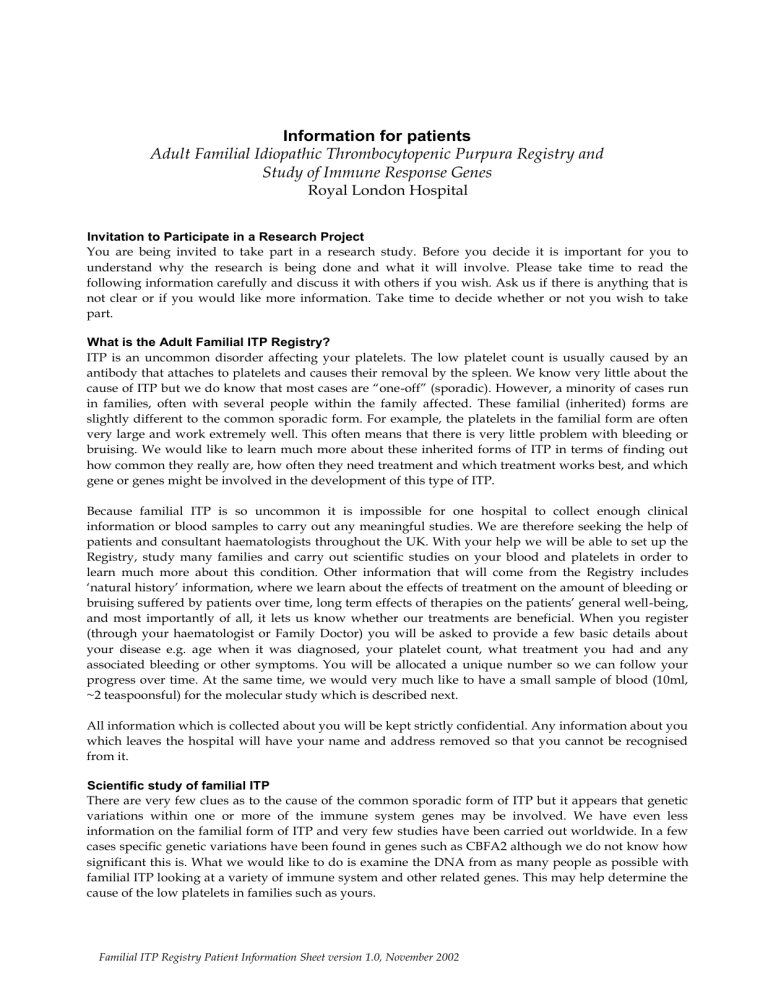
Information for patients
Adult Familial Idiopathic Thrombocytopenic Purpura Registry and
Study of Immune Response Genes
Royal London Hospital
Invitation to Participate in a Research Project
You are being invited to take part in a research study. Before you decide it is important for you to understand why the research is being done and what it will involve. Please take time to read the following information carefully and discuss it with others if you wish. Ask us if there is anything that is not clear or if you would like more information. Take time to decide whether or not you wish to take part.
What is the Adult Familial ITP Registry?
ITP is an uncommon disorder affecting your platelets. The low platelet count is usually caused by an antibody that attaches to platelets and causes their removal by the spleen. We know very little about the cause of ITP but we do know that most cases are “one-off” (sporadic). However, a minority of cases run in families, often with several people within the family affected. These familial (inherited) forms are slightly different to the common sporadic form. For example, the platelets in the familial form are often very large and work extremely well. This often means that there is very little problem with bleeding or bruising. We would like to learn much more about these inherited forms of ITP in terms of finding out how common they really are, how often they need treatment and which treatment works best, and which gene or genes might be involved in the development of this type of ITP.
Because familial ITP is so uncommon it is impossible for one hospital to collect enough clinical information or blood samples to carry out any meaningful studies. We are therefore seeking the help of patients and consultant haematologists throughout the UK. With your help we will be able to set up the
Registry, study many families and carry out scientific studies on your blood and platelets in order to learn much more about this condition. Other information that will come from the Registry includes
‘natural history’ information, where we learn about the effects of treatment on the amount of bleeding or bruising suffered by patients over time, long term effects of therapies on the patients’ general well-being, and most importantly of all, it lets us know whether our treatments are beneficial. When you register
(through your haematologist or Family Doctor) you will be asked to provide a few basic details about your disease e.g. age when it was diagnosed, your platelet count, what treatment you had and any associated bleeding or other symptoms. You will be allocated a unique number so we can follow your progress over time. At the same time, we would very much like to have a small sample of blood (10ml,
~2 teaspoonsful) for the molecular study which is described next.
All information which is collected about you will be kept strictly confidential. Any information about you which leaves the hospital will have your name and address removed so that you cannot be recognised from it.
Scientific study of familial ITP
There are very few clues as to the cause of the common sporadic form of ITP but it appears that genetic variations within one or more of the immune system genes may be involved. We have even less information on the familial form of ITP and very few studies have been carried out worldwide. In a few cases specific genetic variations have been found in genes such as CBFA2 although we do not know how significant this is. What we would like to do is examine the DNA from as many people as possible with familial ITP looking at a variety of immune system and other related genes. This may help determine the cause of the low platelets in families such as yours.
Familial ITP Registry Patient Information Sheet version 1.0, November 2002
How might this research help?
Although this study may not have an immediate impact on your own familial ITP, it will possibly benefit patients in the future and:
1.
It may help us find out what causes familial ITP
2.
It may provide clues about the cause of sporadic ITP
3.
By analysing information from a large number of registered patients we should have a better understanding of which treatments to use in the future, although it is unlikely to alter your treatment at present
What are we asking from you?
If you agree to take part in this study, it will simply involve taking an extra 10ml of blood—on one
occasion only—at the same time as you have your routine blood count at the outpatient clinic. There are no hazards in this research, and the amount of blood which we take for the research is very small and will not make you anaemic or feel in any way unwell.
All the results obtained will be coded in such a way that your identity will be unknown to the researchers.
Of course, you do not have to join the study and please be assured that if you decide not to take part your care will not be affected in any way.
What will happen to the results of the research study?
The Registry information will be published periodically in the form of properly peer-reviewed papers so that other clinicians dealing with patients who have familial ITP are better informed about the disorder.
In addition, we will publish outlines of the Registry and the scientific study in The Platelet, the newsletter of The ITP Support Association who are funding part of the molecular study. We will also present information at the Annual ITP Convention, organised each year by The ITP Support Association.
Who has reviewed the study
The Registry is identical to that in other diseases and has not been reviewed since it simply involves the collection of information. The molecular study has been reviewed by several senior clinicians involved in the ITP field, both in the US and the UK. The funding we obtained was based on a favourable review by these reviewers.
What happens if you are worried or if you would like more information?
You will always be able to contact an investigator to discuss your concerns and/or to get help:
Name: Dr Drew Provan
Address: The Royal London Hospital, London E1 1BB
Telephone number: 020-7377-7178 or through switchboard (radiopage)
OR
Name: Sister Deborah Kenny, ITP Nurse Specialist
Address: The Royal London Hospital, London E1 1BB
Telephone number: 020-7377-7652
We will take every care in the course of this study. If through our negligence any harm to you results, you will be compensated. However, a claim may have to be pursued through legal action. Even if the harm is not our fault, the Trust will consider any claim sympathetically. If you are not happy with any proposed compensation you may have to pursue your claim through legal action.
